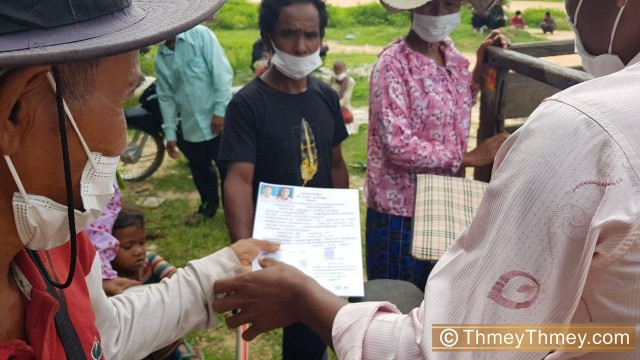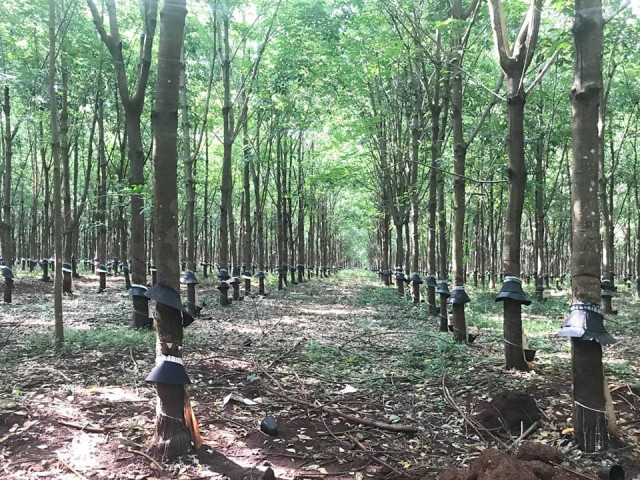Villagers Demand Fair Compensation for Land, Threatened with Violence and Eviction

- By Isa Rohany
- July 27, 2021 6:38 PM
Families from Tani Village, Siem Reap Province, have refused the “unacceptable” compensation they were offered by local authorities for their land and are protesting their eviction
SIEM REAP--A group of 23 families from Tani Village visited the Siem Reap Provincial Hall on July 26 to request that Provincial Governor Tea Seyha intervene in their ongoing land dispute.
Their attempts to demand a solution from Governor Seyha came after the villagers were given just 15 days to accept the authorities’ policy on the matter. The ultimatum was, the authorities said, the end of the dispute.
While civil society groups, along with affected families, attempted to the delay the resolution, provincial authorities have rejected it and maintained their original offer of compensation, but residents of Tani Village have said that they were threatened with violence by the authorities if they continued to protest or refuse the government’s decision to evict them.
Farmers' representative Hun Ravuth said that he was deeply saddened by the authorities’ refusal to provide a fair settlement to the people.
Instead, Ravuth said, the government is forcing them to accept smaller plots of land in a new location in Run Ta Ek Natureal Village, which is being managed by the Apsara National Authority, who oversee the management of the Angkor Wat Archeological Complex.
He added that all the provincial administration was prepared to offer was a 20-meter by 30-meter plot for each family, but some families are losing as much as 5 hectares to the Apsara National Authority.
However, Ravuth said that the villagers will continue to refuse to be resettled by the provincial administration’s policy as the size of the compensated plots of land was unsuitable compared to their existing farmland. Ravuth added he would not leave his land despite the threats from the authorities.
Meanwhile Siem Reap Provincial Administrative Director, Sok Thol, warned he would take action against the villagers if they continued to protest.
“If they keep demanding, they will be arrested, or we will take legal action,” Sok Thol said.
He said that this case happened a long time ago when Sou Phearin was then Siem Reap’s provincial governor. At that time, he said, there was a development plan for Run Ta Ek Natural Village, and the inter-ministerial committee had already resolved the policy, but later a few families came out to protest. It is unclear whether the families were consulted prior to the inter-ministerial committee’s resolution.
“We and the Apsara National Authority want to end this dispute, so we offer 20-by-30-meter plots of land to the affected people like the people living on the riverbank,” Thol said. “However, they refuse to accept.”
Sous Narin, a human rights officer at ADHOC’s Siem Reap provincial office, urged the authorities to address this issue with understanding rather than violence against the villagers.
“Let the solution be fair and just,” Narin said. “These two words are enshrined in the land law. Therefore, if the solution is not appropriate and fair and does not provide them with reasonable compensation, it is an act that violates the rights of citizens to occupy the land.”
The petition, which was submitted to the Siem Reap Provincial Hall on July 26, stated that the affected villagers were legally occupying the land and had farmed it since inheriting it from their ancestors. They had a valid title deed recognized by the local authorities, the petition said.
The villagers asked the authorities to resolve the issue in accordance with the rights and the law to ensure social justice and justice of the law.
Authorities began the development project of the Run Ta Ek Natural Village in 2005 to provide housing and plantations for villagers in Area 1 and Area 2 of the Angkor site. The village covers an area of more than 1,000 hectares, and at that time the authorities bought the land for $300 to $700 per hectares, depending on the actual geography.
However, more than 20 families have refused to sell their land and, despite threats of violence, are continuing to demand a fair and just settlement.
Additional reporting by Teng Yalirozy















